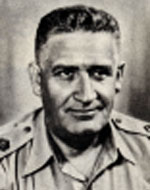Orbach, Moshe
Son of Shlomo and Mindel. He was born on March 19, 1904, in the city of Lodz, Poland. In addition to the traditional atmosphere in his parents’ home, he acquired Zionist and pioneering values in the Hashomer Hatzair movement. For a short period of time he served in the Polish army and in 1921 immigrated to Israel and made his home in Jerusalem. He began to work in the Haganah immediately upon his arrival in Israel and worked there tirelessly and with a pause, out of love and devotion. From the beginning he came to work as a construction worker; After that, for two years (1923-1925), he was a policeman. From 1926 (until the War of Independence) he was an independent merchant and at the same time served as the “ransom-settlement”. In the 1929 riots he served as a company commander, was very active and did much to protect the city in general. He served as a commander and commander in the district. After the events of 1929, he devoted much of his time to the organization of other Hagana members within regional groups. When the provinces were divided into ropes he became one of the first cordon commanders in the district. Was a popular figure among the members of the Haganah in Jerusalem and his apartment was a committee for the defenders in all their activities. During the War of Independence and the period of the siege of the capital, he was the administrative officer of the Jerusalem district headquarters, a position that obliged him to devote himself day and night to him. Even after the establishment of the State of Israel, he continued his service in the defense of the people and reached the rank of colonel in the IDF (officially enlisted in the IDF in June 1948). He was the head of the AAGA when Jerusalem was under military rule, and later moved to the Israel Air Force as a wing commander, and since his retirement in 1955 he devoted himself to the Department of Commemoration of the Soldier in the Ministry of Defense. The President of Israel, Mr. Yitzhak Ben-Zvi, sought to fill his place of military service in the absence of this country, and he also did so with loyalty and love. Together with all his public works, he found time to devote himself to his home and family – to his wife, son, daughter, and grandchildren. He died in a serious illness on the 23rd of Marcheshvan 5723 (20.11.1962) and was brought to eternal rest in the military cemetery on Mount Herzl in Jerusalem. Some time after his death, a book bearing his name appeared, including memoirs of the Deputy Minister of Defense at the time, Mr. Shimon Peres, the then chief of staff, Lieutenant General Tzvi Tzur, Rachel Yanait son of Zvi, and others.
